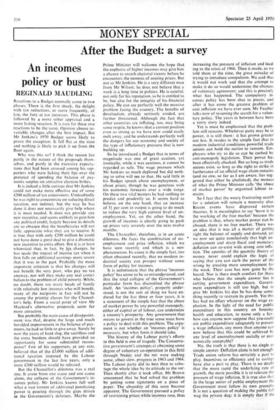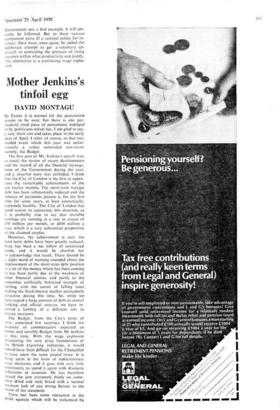MONEY SPECIAL After the Budget: a survey An incomes policy
or bust
REGINALD 1VIAUDLING
Reactions to a Budget normally come in two phases. There is the first shock, the delight with tax reductions, or more frequently, of late, the fury at tax increases. This phase is followed by a more sober appraisal and a more lasting reaction. It is rare for these two reactions to be the same. Opinion almost in- variably changes after the first impact. But Mr Jenkins's 1970 Budget seems likely to prove the exception. It fell flat at the time and nothing is likely to pick it up from the floor again.
Why was this so? I think the reason lies partly in the nature of the proposals them- selves, and partly in the excessive expecta- tions that had been aroused among his sup- porters who were licking their lips over the prospect of spending the balance of pay- ments surplus on attractive election bribes.
It is indeed a little curious that Mr Jenkins could not make more effective use of some £200 million of tax concessions. Undoubtedly he was right to concentrate on reducing direct taxation, not indirect, but the way he has done it does not necessarily give help where it is most needed. It does not provide any new incentive, and seems unlikely to gain him any political credit, largely because its details are so obscure that the beneficiaries will not fully appreciate what they are to receive. It is true that with only f200 million he could not have done a great deal to give a dramatic new incentive to extra effort. But it is at least whimsical that, in fact, by his changes, he has made the impact of income tax when it first falls on additional earnings more severe that it was in the past. Probably the more important criticism is that his changes will not benefit the very poor, who pay no tax anyway, nor will they make any real contri- bution to the problem of child poverty. While, no doubt, there are many heads of family with relatively low incomes who will benefit, many of the recipients in fact will not be among the priority classes for the Chancel- lor's help. From a social point of view Mr Macleod's alternative proposals seem far more attractive.
But probably the main cause of disappoint- ment was that, despite the large and much heralded improvement in the balance of pay- ments, he had so little to give away. Surely by now the years of hard slog, the sacrifices and the extra burdens should have provided an opportunity for some substantial recom- pense? Few of his supporters, at any rate, believed that of the £3,000 million of addi- tional taxation imposed by the Labour government in the last five years. only a mere £200 million would be released.
But the Chancellor's dilerAma was a real one. It arose from one cause and one cause alone, the collapse of the Government's in- comes policy. Mr Jenkins knows full well what a vast torrent of additional purchasing power is pouring through the gaps driven in the Government's defences. Maybe the Prime Minister will welcome the hope that the euphoria of higher incomes may give him a chance to snatch electoral victory before he encounters the nemesis of soaring prices. But not so Mr Jenkins. He is a very different man from Mr Wilson; he does not believe that a week is a long time in politics. He is careful, not only for his reputation, as he is entitled to be, but also for the integrity of his financial policy. He can see perfectly well the massive problem facing the country. The benefits of devaluation, already seriously eroded, are further threatened. Although the fact that other countries are inflating, too, may bring some respite, he knows that a current position even as strong as we have now could easily melt away, and he understands perfectly well the dangers for our economy and society of the type of inflationary pressure that is now building up.
So he introduced a Budget that in terms of magnitude was one of great caution, yet ironically, while it was cautious, it cannot be regarded as safe. The wage pressure which Mr Jenkins so much deplored but did noth- ing to solve will see to that. He said little in his Budget speech about unemployment, or about prices, though he was generous with his economic forecasts over a wide range. On thee two vital knatters he had nothing to predict and prudently so. It seems hard to believe, on the one hand, that an increase of 3f per cent in output is going to do much to reduce the very high current level of un- employment. Yet, on the other hand, the growth of incomes is clearly going to push up prices very severely over the next twelve months.
The Chancellor, therefore, is in an acute dilemma. He faces the combination of un- employment and price inflation, which we have seen recently and which is a new phenomenon. Its cause is the simple fact, too often obscured recently, that no modern in- dustrial society can prosper without some form of policy for incomes.
It is unfortunate that the phrase 'incomes policy' has come to be so misunderstood, and that the total collapse of the GOvernment's particular form has discredited the phrase itself. An 'incomes policy', properly under- stood, is not the sort of thing we have en- dured for the last three or four years, it is a statement of the simple fact that the abuse of market power by any powerful monopoly, either of capital or of labour, can undermine a country's prosperity. Any government that means to govern in the true sense must have a policy to deal with this problem. The argu- ment is not whether an 'incomes policy' is necessary, but what form it should take.
The history of the Labour party's efforts in this field is one of tragedy. The Conserva- tive government's attempts at obtaining some degree of voluntary co-operation in this field through Neddy and the NIC were making some, albeit slow, progress in 1963 and 1964. The Labour party did its best then to sabo- tage the whole idea by its attitude to the Mc. Then shortly after it took office, Mr Brown announced that he had solved the problem by getting some signatures on a piece of paper. The absurdity of this soon became apparent. The Government pursued a policy of restraining prices while incomes rose, thus
increasing the pressure of inflation and lead- ing to the crisis of 1966. Then it made, as we told them at the time, the great mistake of trying to introduce compulsion. We said that it would not work and that the attempt to make it do so would undermine the chances of voluntary agreement; and this is precisely what has happened. The compulsory in- comes policy has been shot to pieces, and after it has come the greatest problem of cost inflation we have ever seen. Mr Feather talks now of resuming the search for a volun- tary policy. The years in between have been a sorry story indeed.
Yet is must be emphasised that the prob- lem still remains. Whichever party may be in power, it is still there : it has grown greater not less. It resides in the simple fact that in modern industrial conditions powerful trade unions can hold the nation to ransom. Em- ployers who try to do so can be curbed by anti-monopoly legislation. Their power has been effectively checked. But so long as trade unions exist, so long as the right to strike in furtherance of an official wage claim remains (and no one, so far as I am aware, has sug- gested that either be abolished), the menace of what the Prime Minister calls 'the abuse of market power' by organised labour re- mains.
So I fear that the weary frustrating search for a solution will remain a necessity also. Recent events have disproved certain theories. It is meaningless to say 'leave it to the working of the free market' because the problem is that, where market power can be abused, there is no free market. There was an idea that it was all a matter of getting right the balance of supply and demand, yet we now see quite conclusively that high un- employment and sharp fiscal and monetary deflation can co-exist with strong cost infla- tion. The apostles of the quantity theory of money never could explain the logic of saying that you can curb the power of the strong by creating more unemployment for - the weak. Their case has now gone by the board. Nor is there much comfort for those who believe that the simple answer lies in cutting government expenditure. Govern- ment expenditure is still too high, but to give Mr Jenkins his due he has done some- thing recently to restrain its growth. Yet this has had no effect whatever on the wage ex- plosion. In the light of the need for public expenditure in this country on housing. health and education, to name only a few. how can anyone now suppose that you could cut public expenditure adequately to prevent a wage inflation, any more than anyone can now believe that this could be achieved by any level of unemployment socially or eco- nomically acceptable?
No. the truth is that there is no single or simple answer. Deflation alone is not enough. Trade union reform has certainly a part to play. Incentives to efficiency and to saving, have also a part to play. There is no doubt that the more rapid the underlying rate of growth, the more possible it is to tolerate the pressure of wage inflation. It is true also that in the large sector of public employment the Government must follow its own precepts. It is not a question of making the public tail wag the private dog; it is simply that if the
Government sets a bad example, it will cer- tainly be followed. But to these various component parts of a rational policy for in- comes, there must, once again, be added the deliberate attempt to get a voluntary ap- proach to containing the pressure of rising incomes within what productivity can justify. The alternative is a continuing wage explo- sion.







































 Previous page
Previous page